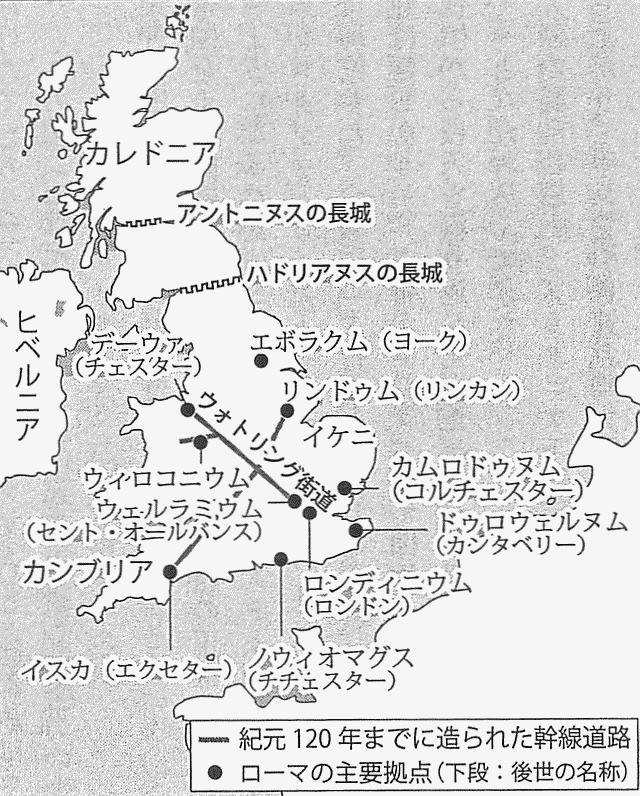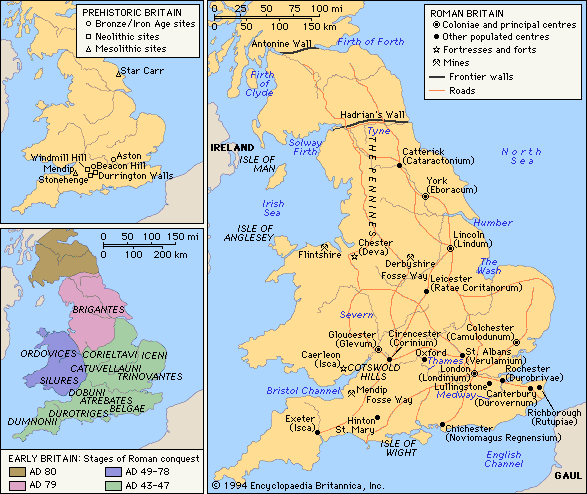2023-11-29 Wed
■ #5329. 古英語地名に残る数少ないラテン語の遺産 [name_project][etymology][onomastics][toponymy][oe][roman_britain][celtic]
ローマン・ブリテン時代の後に続く古英語期の地名には,思いのほかラテン語の痕跡が少ない.実際,純粋なラテン語由来の地名はほとんどないといってよい.ただし,部分的な要素として生き残っているものはある(cf. 「#3440. ローマ軍の残した -chester, -caster, -cester の地名とその分布」 ([2018-09-27-1])).
Clark (481) は Lincoln, Catterick, camp, eccles, funta, port, wīc などを挙げているが,確かに全体としてあまり目立たない.
Unlike those once-Romanised areas that were destined to become Romance-speaking, England shows hardly any place-names of purely Latin origin. Few seem to have been current even in Romano-British times; fewer still survived . . . . PDE Lincoln is a contraction of Lindum Clonia, where the first element represents British *lindo 'pool' . . . . Whether Catterick < RB Cataractonium derives ultimately from Latin cataracta in supposed reference to rapids on the River Swale)(sic) or from a British compound meaning 'battle-ramparts' is uncertain . . . .
The main legacy of Latin to Old English toponymy consisted not of names but of name-elements, in particular: camp < campus 'open ground, esp. that near a Roman settlement'; eccles < ecclesia 'Christian church'; funta < either fontana or fons/acc. fontem 'spring, esp. one with Roman stonework'; port < portus 'harbour'; and the already-mentioned wīc < vicus 'settlement, esp. one associated with a Roman military base', together with its hybrid compound wīchām . . . . Names involving these loan-elements occur mainly in districts settled by the English ante AD 600, and often near a Roman road and/or a former Roman settlement . . . .
イングランドの地名に関する限り,ラテン語は(後の中英語期以降に関与してくる)フランス語と同様に,微々たる貢献しかなしてこなかったといってよい.
・ Clark, Cecily. "Onomastics." The Cambridge History of the English Language. Vol. 1. Ed. Richard M. Hogg. Cambridge: CUP, 1992. 452--89.
2023-11-27 Mon
■ #5327. York でみる地名と民間語源 [name_project][etymology][folk_etymology][onomastics][toponymy][oe][roman_britain][celtic][diphthong][old_norse][sound_change]
「#5203. 地名と民間語源」 ([2023-07-26-1]) でみたように,地名には民間語源 (folk_etymology) が関わりやすい.おそらくこれは,地名を含む固有名には,指示対象こそあれ「意味はない」からだろう(ただし,この論点についてはこちらの記事群を参照).地名の語源的研究にとっては頭の痛い問題となり得る.
Clark (28--29) に,York という地名に関する民間語源説が紹介されている.
. . . 'folk-etymology' --- that is, replacement of alien elements by similar-sounding and more or less apt familiar ones --- can be a trap. The RB [= Romano-British] name for the city now called York was Ebŏrācum/Ebŭrācum, probably, but not certainly, meaning 'yew-grove' . . . . To an early English ear, the spoken Celtic equivalent apparently suggested two terms: OE eofor 'boar' --- apt enough either as symbolic patron for a settlement or as nickname for its founder or overlord --- and the loan-element -wīc [= "harbour"] . . ., hence OE Eoforwīc . . . . (The later shift from Eoforwīc > York involved further cross-cultural influence . . . .) Had no record survived of the RB form, OE Eoforwīc could have been taken as the settlers' own coinage; doubt therefore sometimes hangs over OE place-names for which no corresponding RB forms are known. The widespread, seemingly transparent form Churchill, for instance, applies to some sites never settled and thus unlikely ever to have boasted a church; because some show a tumulus, others an unusual 'tumulus-like' outline, Church- might here, it is suggested, have replaced British *crǖg 'mound' . . . .
もし York の地名についてローマン・ブリテン時代の文献上の証拠がなかったとしたら,それが民間語源である可能性を見抜くこともできなかっただろう.とすると,地名語源研究は文献資料の有無という偶然に揺さぶられるほかない,ということになる.
ちなみに古英語 Eoforwīc から後の York への語形変化については,Clark (483) に追加的な解説があるので,それも引用しておこう.
OE Eoforwīc was reshaped, with a Scand. rising diphthong replacing the OE falling one, assibilation of the final consonant inhibited, and medial [v] elided before the rounded vowel: thus, Iorvik > York . . . .
・ Clark, Cecily. "Onomastics." The Cambridge History of the English Language. Vol. 1. Ed. Richard M. Hogg. Cambridge: CUP, 1992. 452--89.
2019-09-28 Sat
■ #3806. 講座「英語の歴史と語源」の第4回「ゲルマン民族の大移動」のご案内 [asacul][notice][latin][roman_britain]
2週間先のことになりますが,10月12日(土)の15:15?18:30に,朝日カルチャーセンター新宿教室にて「英語の歴史と語源・4 ゲルマン民族の大移動」と題する講演を行ないます.ご関心のある方は,こちらよりお申し込みください.過去3回ともに大勢の方にご参加いただき,活発な議論の時間をもつことができましたので,今回も楽しみにしています.今回の趣旨は以下の通りです.
紀元449年,ゲルマン民族の大移動の一環として,西ゲルマン語群に属するアングル人,サクソン人,ジュート人がブリテン島に渡来しました.彼らの母語こそが英語であり,この時期をもって英語の歴史も本格的に始動します.イングランドを築いた彼らは,ゲルマン的なアングロサクソン文化を開花させますが,その文化を支えた「古英語」はいまだゲルマン的色彩の濃い言語的特徴を保っていました.今回も本シリーズの趣旨に沿い,現代まで受け継がれてきた古英語の豊かな語彙的遺産を中心に鑑賞していきましょう.
講座では「ゲルマン民族の大移動とアングロ・サクソンの渡来」「古英語の語彙」「現代に残る古英語の語彙的遺産」というラインナップで,英語語彙のコアを形成している本来語の資産について,詳しく論じる予定です.予習として,anglo-saxon や oe の各記事をご覧ください.
2019-09-14 Sat
■ #3792. 講座「英語の歴史と語源」の第3回「ローマ帝国の植民地」を終えました [asacul][notice][latin][roman_britain][etymology][slide][link]
「#3781. 講座「英語の歴史と語源」の第3回「ローマ帝国の植民地」のご案内」 ([2019-09-03-1]) で紹介したとおり,9月7日(土)15:15?18:30に朝日カルチャーセンター新宿教室にて「英語の歴史と語源・3 ローマ帝国の植民地」と題する講演を行ないました.過去2回と同様,大勢の方々に参加いただきまして,ありがとうございました.核心を突いた質問も多数飛び出し,私自身もおおいに勉強になりました. *
今回は,(1) ローマン・ブリテンの時代背景を紹介した後,(2) 同時代にはまだ大陸にあった英語とラテン語の「馴れ初め」及びその後の「腐れ縁」について概説し,(3) 最初期のラテン借用語が意外にも日常的な性格を示す点に注目しました.
特に3点目については,従来あまり英語史で注目されてこなかったように思われますので,具体例を挙げながら力説しました.ラテン借用語といえば,語彙の3層構造のトップに君臨する語彙として,お高く,お堅く,近寄りがたいイメージをもってとらえられることが多いのですが,こと最初期に借用されたものには現代でも常用される普通の語が少なくありません.ラテン語に関するステレオタイプが打ち砕かれることと思います.
講座で用いたスライド資料をこちらに置いておきます.本ブログの関連記事へのリンク集にもなっていますので,復習などにお役立てください.
次回の第4回は10月12日(土)15:15?18:30に「英語の歴史と語源・4 ゲルマン民族の大移動」と題して,いよいよ「英語の始まり」についてお話しする予定です.
1. 英語の歴史と語源・3 「ローマ帝国の植民地」
2. 第3回 ローマ帝国の植民地
3. 目次
4. 1. ローマン・ブリテンの時代
5. ローマン・ブリテンの地図
6. ローマン・ブリテンの言語状況 (1) --- 複雑なマルチリンガル社会
7. ローマン・ブリテンの言語状況 (2) --- ガリアとの比較
8. ローマ軍の残した -chester, -caster, -cester の地名
9. 多くのラテン地名が後にアングロ・サクソン人によって捨てられた理由
10. 2. ラテン語との「腐れ縁」とその「馴れ初め」
11. ラテン語との「腐れ縁」の概観
12. 現代英語におけるラテン語の位置づけ
13. 3. 最初期のラテン借用語の意外な日常性
14. 行為者接尾辞 -er と -ster も最初期のラテン借用要素?
15. 古英語語彙におけるラテン借用語比率
16. 借用の経路 --- ラテン語,ケルト語,古英語の関係
17. cheap の由来
18. pound (?) の由来
19. Saturday とその他の曜日名の由来
20. まとめ
21. 参考文献
2019-09-08 Sun
■ #3786. ローマン・ブリテンの略年表と地図 [roman_britain][timeline][history][map]
「#3784. ローマン・ブリテンの言語状況 (1)」 ([2019-09-06-1]) と「#3785. ローマン・ブリテンの言語状況 (2)」 ([2019-09-07-1]) で,ローマン・ブリテンの話題を取り上げた.君塚や指のイギリス史概説書を参照して,この時代を中心とする略年表を作成してみた(イギリス史全体の年表については,「#3478. 『図説イギリスの歴史』の年表」 ([2018-11-04-1]),「#3487. 『物語 イギリスの歴史(上下巻)』の年表」 ([2018-11-13-1]),「#3497. 『イギリス史10講』の年表」 ([2018-11-23-1]) などを参照).
| 81万年前頃 | ブリテン付近に人類が居住 |
| 紀元前1万年頃 | 狩猟採集民が居住(旧石器時代末期) |
| 前7--6千年頃 | ブリテン島が大陸から分離 |
| 前4千年頃 | 農耕・牧畜の開始(新石器時代の開始) |
| 前22--20世紀頃 | ビーカー人が渡来(青銅器時代の開始) |
| 前18世紀頃 | ストーンヘンジの建造 |
| 前6世紀頃 | ケルト系のベルガエ人の渡来 |
| 前2世紀末 | ベルガエ人が高度な鉄器文化と農牧文化を築く |
| 前55--54年 | ユリウス・カエサルのブリタニア遠征 |
| 43年 | ローマ皇帝クラウディウスのブリタニア侵攻 |
| 50年頃 | ロンディニウム(ロンドン)の建設 |
| 61年 | イケニ族の女王ボウディッカの反乱 |
| 80年頃 | ローマ軍,スコットランドに到着 |
| 122--132年 | ハドリアヌスの長城の建造 |
| 140年頃 | アントニヌスの長城の建造(しかし,60年後に放棄) |
| 2世紀末 | ロンドンが中心都市として発達し,街道も整備される |
| 211年 | ブリテン,ローマと協約締結し「同盟者」に |
| 306年 | ブリタニアで即位したコンスタンティヌス,帝国の再編へ |
| 4世紀半ば | キリスト教の伝来,ヨークとロンドンに司教座 |
| 406年 | 大陸のゲルマン諸部族,ライン川を超えてガリアへ侵入 |
| 410年 | ローマ,ブリタニアから撤退 |
| 449年 | アングロ・サクソンの渡来が始まる |
| 6世紀末 | 7王国の成立 |
| 597年 | 聖アウグスティヌス,キリスト教宣教のために教皇グレゴリウス1世によってローマからケント王国へ派遣される |
| 664年 | ウィットビーの宗教会議でローマキリスト教の優位が認められる |
ローマン・ブリテンの関連地図も,君塚 (9) の「「ローマ帝国支配のブリテン島」と,Encyclopaedia Britannica からのもの (Encyclopaedia Britannica 2008 Ultimate Reference Suite. Chicago: Encyclopaedia Britannica, 2008.) を挙げておこう.


ついでに Encyclopaedia Britannica から見つけた,ローマ軍に抵抗したイケニ族の女王ボアディッカを描いた19世紀の版画も挙げておく (Queen Boudicca leading a revolt against the Romans, engraving, 19th century. The Granger Collection, New York) .

ローマン・ブリテン時代のその他の話題については「#3440. ローマ軍の残した -chester, -caster, -cester の地名とその分布」 ([2018-09-27-1]) ほか roman_britain の各記事を参照.
・ 君塚 直隆 『物語 イギリスの歴史(上下巻)』 中央公論新社〈中公新書〉,2015年.
・ 指 昭博 『図説イギリスの歴史』 河出書房新社,2002年.
[ 固定リンク | 印刷用ページ ]
2019-09-07 Sat
■ #3785. ローマン・ブリテンの言語状況 (2) [roman_britain][latin][celtic][history][gaulish][contact][language_shift][prestige][sociolinguistics]
昨日の記事に続き,ローマン・ブリテンの言語状況について.Durkin (58) は,ローマ時代のガリアの言語状況と比較しながら,この問題を考察している.
One tantalizing comparison is with Roman Gaul. It is generally thought that under the Empire the linguistic situation was broadly similar in Gaul, with Latin the language of an urbanized elite and Gaulish remaining the language in general use in the population at large. Like Britain, Gaul was subject to Germanic invasions, and northern Gaul eventually took on a new name from its Frankish conquerors. However, France emerged as a Romance-speaking country, with a language that is Latin-derived in grammar and overwhelmingly also in lexis. One possible explanation for the very different outcomes in the two former provinces is that urban life may have remained in much better shape in Gaul than in Britain; Gaul had been Roman for longer than Britain, and urban life was probably much more developed and on a larger scale, and may have proved more resilient when facing economic and political vicissitudes. In Gaul the Franks probably took over at least some functioning urban centres where an existing Latin-speaking elite formed the basis for the future administration of the territory; this, combined with the importance and prestige of Latin as the language of the western Church, probably led ultimately to the emergence of a Romance-speaking nation. In Britain the existing population, whether speaking Latin or Celtic, probably held very little prestige in the eyes of the Anglo-Saxon incomers, and this may have been a key factor in determining that England became a Germanic-speaking territory: the Anglo-Saxons may simply not have had enough incentive to adopt the language(s) of these people.
つまり,ローマ帝国の影響が長続きしなかったブリテン島においては,ラテン語の存在感はさほど著しくなく,先住のケルト人も,後に渡来してきたゲルマン人も,大きな言語的影響を被ることはなかったし,ましてやラテン語へ言語交代 (language_shift) することもなかった.しかし,ガリアにおいては,ローマ帝国の影響が長続きし,ラテン語(そしてロマンス語)との言語接触も持続したために,最終的に基層のケルト語も後発のフランク語も,ラテン語に呑み込まれるようにして消滅していくことになった,というわけだ.
ブリテン島とガリアは,ケルト系言語の基層の上にラテン語がかぶさってきたという点では共通の歴史を有しているようにみえるが,ラテン語との接触の期間や密度という点では差があり,それが各々の地域における後世の言語事情にも重要なインパクトを与えたということだろう.この差は,部分的にはローマからの距離の差やラテン語に対して抱いていた威信の差へも還元できるものかもしれない.
この両地域の社会言語学的な状況の差は,回り回って英語とフランス語におけるケルト借用語の質・量の差にも影響を与えている.これについては,Durkin による「#3753. 英仏語におけるケルト借用語の比較・対照」 ([2019-08-06-1]) を参照されたい.
・ Durkin, Philip. Borrowed Words: A History of Loanwords in English. Oxford: OUP, 2014.
2019-09-06 Fri
■ #3784. ローマン・ブリテンの言語状況 (1) [roman_britain][latin][celtic][history][sociolinguistics][bilingualism]
Claudius 帝によるブリテンの征服が成った43年から,ローマが撤退する410年までのローマン・ブリテン時代には,言語状況はいかなるものだったのか.ケルト系言語とラテン語はどのくらい共存しており,どの程度のバイリンガル社会だったのか.これらの問題については正確なことが明らかにされておらず,およそ推測の域を出ないが,1つの見解として Durkin (57--58) の説明に耳を傾けてみよう
Unfortunately for our purposes, the linguistic situation is one of the things about which we know the least. During the period of Roman imperial domination, Latin was certainly the language of administration and of much of the elite; what is much less certain, and rather hotly disputed, is whether it was also the language of the 'man in the street', and if it was, whether it remained so in more troubled times before the arrival of the Anglo-Saxons. The assumption made by most scholars is that Latin had relatively little currency outside the urban areas; that (some form of) Celtic was the crucial lingua franca; while auxiliaries recruited from many locations both inside and outside the Roman Empire probably spoke their own native languages. There were certainly Germani among such auxiliaries. There were probably also slaves of Germanic origin in Britain and in the later stages of Roman Britain there were also certainly at least some mercenaries and other irregular forces of Germanic origin, and some settlements associated with such people. They may have been quite numerous, but it is unlikely that they had any significant impact on the subsequent linguistic history of Britain.
ラテン語はブリテン島に点在する都市部でこそ用いられていたが,それ以外では従来のケルト語の世界が広がっていたはずだというのが,大方の見解である.公的な領域においてはバイリンガル社会は存在したと思われるが,それほど著しいものではなかったろう.一方,ローマン・ブリテン時代の後期には,ゲルマン人もある程度の数でブリテン島に住まっていたことは確かなようであり,当時の言語状況はさらに複雑だったと思われる.
ローマン・ブリテン時代にさかのぼる地名の話題については「#3440. ローマ軍の残した -chester, -caster, -cester の地名とその分布」 ([2018-09-27-1]),「#3454. なぜイングランドにラテン語の地名があまり残らなかったのか?」 ([2018-10-11-1]) を参照.
・ Durkin, Philip. Borrowed Words: A History of Loanwords in English. Oxford: OUP, 2014.
2019-09-03 Tue
■ #3781. 講座「英語の歴史と語源」の第3回「ローマ帝国の植民地」のご案内 [asacul][notice][latin][roman_britain]
今週末,9月7日(土)の15:15?18:30に,朝日カルチャーセンター新宿教室にて「英語の歴史と語源・3 ローマ帝国の植民地」と題する講演を行ないます.講座「英語の歴史と語源」の第3回となりますが,過去2回と同様,皆さんとの活気ある議論を楽しみにしています.ご関心のある方は,こちらよりお申し込みください.今回の趣旨は以下の通りです.
紀元前後,ブリテン島の大半はローマ帝国の版図に組み込まれました.この時代にはブリテン島はいまだケルトの島であり,英語が話される土地ではありませんでした.しかし,ローマ帝国から文明の言語としてもたらされたラテン語は,ケルト語を経由して,後にやってくる英語にも影響を与えたほか,当時大陸にいたアングロサクソン人にも直接,語彙的な影響を及ぼしました.英語にみられるラテン語単語の遺産を覗いてみましょう.
英語のラテン語との関係は,ヨーロッパ諸言語の例に洩れず,英語が英語となる前の紀元前から続く「腐れ縁」です.両言語は同じ印欧語族の親戚筋であるとはいえ,ゲルマン語派とイタリック語派という異なる派閥に属するために,血のつながりは決して濃くはありません.しかし,いってみれば知人としてあまりに長い間付き合ってきたために,英語はラテン語なしでは自らを表現できないほどまでにラテン語を自らの一部として取り込むに至りました.
したがってラテン語の影響は英語史を通じて続いていくわけですが,今回はブリテン島がローマ帝国の植民地となった前後の時代,つまり英語史上,最初にラテン語のインパクトが確認される時代(英語そのものはブリテン島ではなくいまだ大陸で用いられた時代ではありますが)に焦点を当て,英語とラテン語の「馴れ初め」を紹介します.その上で「馴れ初め」後の関係の展開についても述べる予定です.
今回の講演と関連して「#1437. 古英語期以前に借用されたラテン語の例」 ([2013-04-03-1]),「#1945. 古英語期以前のラテン語借用の時代別分類」 ([2014-08-24-1]),「#2578. ケルト語を通じて英語へ借用された一握りのラテン単語」 ([2016-05-18-1]),「#3440. ローマ軍の残した -chester, -caster, -cester の地名とその分布」 ([2018-09-27-1]),「#3454. なぜイングランドにラテン語の地名があまり残らなかったのか?」 ([2018-10-11-1]) などの記事をご覧ください.
2018-10-11 Thu
■ #3454. なぜイングランドにラテン語の地名があまり残らなかったのか? [latin][roman_britain][anglo-saxon][toponymy][onomastics]
昨日の記事「#3453. ノルマン征服がイングランドの地名に与えた影響」 ([2018-10-10-1]) に引き続きイングランド地名の話題.ローマン・ブリテン時代には,当然ながら建設された都市にはラテン名が付けられていた.その代表が「#3440. ローマ軍の残した -chester, -caster, -cester の地名とその分布」 ([2018-09-27-1]) でみたように,-chester を含む都市名だったわけである.しかし,5世紀のアングロサクソンの渡来を受けて,既存のラテン地名の多くが捨て去られ,後世まで残らなかった.これはなぜだろうか.
デイヴィスとレヴィット (82--83) は,ローマ人とアングロサクソン人では,ブリテン島にやってきた目的が異なっていた点に注目している.
ラテン語の地名は,英語が流入してきた地域では英語の浸透によって消滅した.これまでこれまで述べてきたことに付け加えて,ラテン語の地名が残らなかったもうひとつの重要な原因は,アングロ・サクソン人はローマ人とはかなり異なった文化を持っていたということである.アングロ・サクソン人は,居住するための都市を求めて来たのではなく耕すための土地を求めてきたのである.アングロ・サクソン人は自分たちの作った新しいムラの名前を必要とした.ローマ人の作った砦や都市はアングロ・サクソン人の役には立たなかった.ローマ軍の砦は,ローマ軍の撤回からアングロ・サクソン人の到来に至る間に,北方から来た野蛮人に略奪されたか,アングロ・サクソン人の戦争の仕方に合わなかったため放置されたかである.都市と同様に砦は廃れ,それらの名前までも忘れ去られた.
例えば,Dee 川のほとりのローマ軍駐屯地 Deva は,ローマン・ブリテン時代の長きにわたって軍団を収容してきた砦だったが,『アングロ・サクソン年代記』では「廃墟のチェスター」と言及されている.ローマの遺産は,砦もろとも名前も捨て去られたのである.
・ デイヴィス,C. S.・J. レヴィット(著),三輪 伸春(監訳),福元 広二・松元 浩一(訳) 『英語史でわかるイギリスの地名』 英光社,2005年.
2018-09-27 Thu
■ #3440. ローマ軍の残した -chester, -caster, -cester の地名とその分布 [toponym][latin][loan_word][oe_dialect][roman_britain]
「#1437. 古英語期以前に借用されたラテン語の例」 ([2013-04-03-1]) や「#2578. ケルト語を通じて英語へ借用された一握りのラテン単語」 ([2016-05-18-1]) で触れたように,ローマン・ブリテン時代にローマ軍が建設したと考えられる町の名には,ラテン語 castrum (野営地)に由来する要素を含むものが少なくない.このラテン単語は,すでに大陸時代にゲルマン諸語に借用されていたと考えられる.
標題のように,英語の地名要素としてはいくつかの異形があり,その異形の分布には傾向がある.サクソン系が定住したイングランドの比較的南部の地域では,-chester となるものが多い (ex. Colchester, Dorchester, Manchester, Rochester, Winchester) .
一方,アングル系が定住し,後にデーン人が入り込んだ北部・北西部・東部では -caster となるところが多い (ex. Doncaster, Lancaster, Tadcaster) .
また,サクソン系とアングル系が融合したとされる中部地域では -cester が多く,発音はつづまって /-stə/ となる (ex. Bichester, Gloucester, Leicester, Worcester) .『英語語源辞典』によると,この発音は Anglo-French の発音を反映しているといわれる.さらに,ウェールズとの境界近くでは語頭子音が x となり,Exeter, Wroxeter などの例が見られる.
上記の分布は,あくまで傾向を示すにすぎず,必ずしもきれいにはいかないようだが,地名学,方言(音声)学,歴史学の交差点を見ているようで興味が尽きない.以上,デイヴィスとレヴィットの25--26ページを参照して執筆した.
・ デイヴィス,C. S.・J. レヴィット(著),三輪 伸春(監訳),福元 広二・松元 浩一(訳) 『英語史でわかるイギリスの地名』 英光社,2005年.
Powered by WinChalow1.0rc4 based on chalow